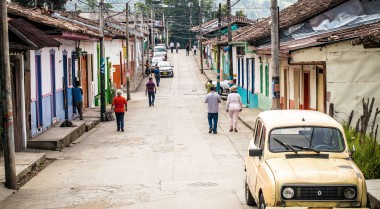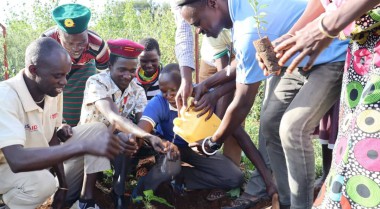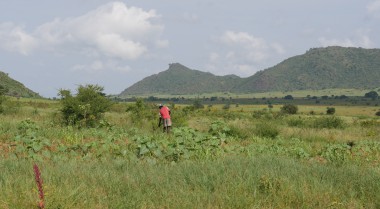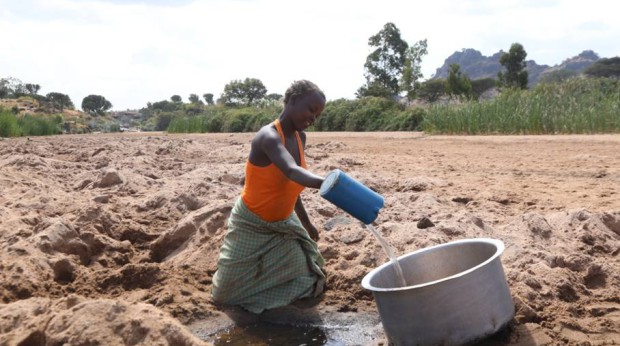
Addressing climate-related security risks in Latin America and the Caribbean with AI and human security approaches
Climate change poses significant peace and security risks in Latin America and the Caribbean (LAC), necessitating innovative approaches based on human security and artificial intelligence (AI). This article explores these potential solutions, based on recent discussions with local peacebuilding experts in the region.
Previous GPPAC reports have shown how climate change and peace and security risks interact in the Pacific, Zimbabwe, Uganda and Mozambique. This article offers an opportunity to extend this focus to the LAC, a region where climate-related security risks are increasingly recognised.
We summarise observations from our recent visit to Panama, where we had a chance to engage with LAC-based peacebuilding and prevention experts from academia and civil society. Our discussions revolved around understanding their perspectives on the interlinkages between climate change and fragility and the action required to address them.
There is a general agreement that climate change exacerbates conflict and fragility across LAC.
The governments within the region do not seem to dispute that fact and focus on finding solutions through collaboration and dialogue. For instance, with the 1978 Amazon Cooperation Treaty, governments aimed to stabilise the situation in Amazon, prevent conflict between countries and the people, and ensure balanced development. This treaty was a sign that securitised methodologies would not be effective in addressing the impacts of climate change because it emphasised cooperation and sustainable development. Subsequent treaties have further supported efforts to prevent conflicts across the Amazon. These policies are in the spirit of sustaining peace and promote the idea that there is no peace without development and no development without peace.
The relationship between the climate and fragility in LAC is two-fold:
First, climate change exacerbates many peace and security risks in the absence of adequate adaptive capacities of communities. For example:
- Climate change leads to competition over resources, including water conflicts. In Venezuela, the state cannot guarantee the distribution of essential resources, forcing residents to travel to forests for wood and rivers for water. This situation results in various conflicts over land and resources, especially in the most remote areas.
- Natural resource exploitation creates conflicts over land rights. Transnational companies (often guarded by the military) engage in steel mining and exploitation of other resources in El Salvador, Guatemala, Honduras, Panama, and across the region. This severely affects the environment and displaces indigenous communities, who already face economic, social and political discrimination. Displaced communities often do not own the land on which their homes are built and lack the means to secure their livelihoods around mining sites. Those who stay to protect their land are killed, without any accountability from their governments. Some governments subsequently benefit from the presence of mining companies financially and do not work to prevent and address local conflicts.
Second, conflict can also have a devastating impact on climate change. For example, in Colombia, the end of conflict meant the need for ex-combatants to transform their livelihoods. Land has been turned to be used for agricultural use and livestock growing. This shift has the potential to overburden land and lead to further conflict over arable land.
The identification of climate-related security risks across the LAC region remains incomplete, and AI offers a solution!
Limited research exists on how climate change and fragility interact across the LAC region, mainly because the conversation on peacebuilding is generally very sensitive across the region. Many governments in the region refrain from talking about peace and security issues and including them in their national development plans. This reluctance leads donors to de-prioritise these issues and focus on other objectives within national development plans.
However, practices within the LAC region can bridge the knowledge gap on the interlinkages between climate change and fragility. GPPAC’s Regional Representative for LAC - Coordinadora Regional de Investigaciones Económicas y Sociales (CRIES) - has explored the use of open source data and AI to document and analyse armed violence, looting, and monitoring of indigenous communities' rights, among other issues. AI can effectively identify instances of exacerbated peace and security risks due to climate change, informing governments about the hotspots and possible conflicts in climate-vulnerable areas.
Utilizing AI, the database on climate change impact could be an effective early warning mechanism both for climate mitigation and adaptation as well as for conflict prevention. As such, it could fulfil the global aspirations to ensure that early warning systems protect everyone on Earth by 2027, as well as the global objective of sustaining peace.
Challenges posed by climate change require a comprehensive approach rooted in human security and human rights accountability.
While AI can help better understand the security risks posed by climate change in LAC, there are at least two pathways for effective response to the peace and security impact of climate change.
Human security approaches are best suited to address the impacts of climate change in LAC. Such approaches entail identifying and addressing widespread and crosscutting challenges to the survival, livelihood and dignity of people. Human security approaches entail:
- implementing climate change solutions in line with the commitments made by the Conferences of the Parties to the UN Framework on Climate Change (UNFCCC), ensuring equal benefits for all members of society including renewable energy, early warning systems and mitigation techniques;
- ensuring the protection and meaningful inclusion of environmental defenders and climate experts in developing climate change solutions locally, nationally and regionally;
- refraining from discussing climate change in the peace and security realm. The history of LAC has proven that such logic may lead to the engagement of the military in the questions of climate change, which can further exacerbate violence and fragility.
Developments within regional human rights policy and accountability effectively complement human security approaches. The Escazu Agreement has the potential to advance regional peace and security through a human rights-based approach. It encourages accountability, transparency and good governance while promoting economic development without the depletion or extraction of natural resources. The Special Jurisdiction for Peace in Colombia found that it is a war crime to cause the destruction of high mountain ecosystems and the degradation by illegal mining and coca cultivation. The Strasbourg court has recently ruled that the governments have human rights obligations when it comes to addressing climate change. Failure to align climate plans with the targets of the Paris Agreement could lead to litigation against European governments in national and international courts. This decision has the potential to influence governments and courts worldwide, including in LAC.
Where do we go from here? Towards sustainable peace in LAC
Achieving sustainable peace in LAC requires a data-driven and action-oriented approach that addresses trends dictated by data.
First, there is more work that needs to be done to explore the relationships between climate change and fragility in LAC. The use of AI and open source investigations could offer an adequate solution for early warning for climate change mitigation and adaptation, as well as conflict prevention, across the region.
Second, once sufficient data is available, governments in the region need to come together to promote an approach that combines human security action and human rights accountability as one avenue to ensure early action.
It is time to start thinking about climate change impacts across the LAC before it is too late!



